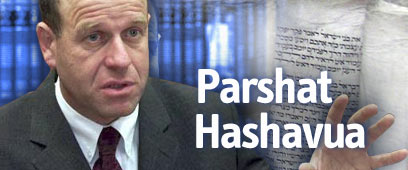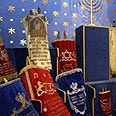

Was Korah corrupt?
Photo: Government Press Office
Korah’s rebellion is one of the best known protest stories in our entire mythology.
Corruption
By Mordechai Gilat and Gidi Weitz
Outgoing state comptroller warns corruption more threatening than security issues
Korah, one of the heads of the tribe of Levi, is not part of Moses and Aaron’s inner circle. He gathers together Datan, Aviram and 250 others to begin his campaign against Moses and Aaron.
On the face of things, it is an open, fundamental demand to share power, authority and perhaps even the fringe benefits that go along with them: “For the entire community - all of them – are holy, and God is among them; why do you exalt yourselves over the congregation of God?” they ask (Numbers 16:3).
In a democracy, Korah’s demand seems entirely legitimate. But in earlier times, the idea was so radical that nature was forced to abrogate its own laws and the earth forced to swallow up the rebels who proposed such heresy.
Where did they go wrong?
Beyond the mask of Biblical words, and Moses’ failure to answer, it is very difficult to discern from the plain meaning of the text what their sin was.
This vagueness has given rise to many rabbinic explanations of Korah’s rebellion. But the haftara, the weekly reading from the books of the prophets that accompanies each Torah portion, may shed interesting light on the incident, or at least into the thoughts of the haftara’s ancient editor.
This week’s haftara is the monumental address by the prophet Samuel.
Injured, Samuel accompanies the people of Israel to Gilgal to renew Saul’s kingship. He is personally hurt by the fact that the people prefer a hereditary kingship over the prophet and his son.
Amongst other things, he criticizes the people: “Here I am: testify about me in the presence of God and in the presence of His anointed: whose ox have I taken? Whose donkey have I taken…and from whom have I taken bribes?| (I Samuel: 12:3)
In today’s terms, Samuel whines: Why get rid of me? Am I corrupt?
Zero tolerance
It would seem that in those days, personal corruption was enough to cancel a person from a leadership role, and was considered cause to get rid of a sitting leader.
Maybe even more: official corruption was, at least in the eyes of a prophet whining about his personal failure, was enough for God to knock a prophet off the throne of leadership in favor of a human king.
The editor of the haftaras wanted to tell us what he thinks about Korah and his followers. So, out of all the complicated and involved issues here, he compares Samuel, who claims his hands are clean, to Moses, who responds directly to Korah, saying, “I have not taken even a single donkey of theirs, nor have I wronged even one of them.” (Numbers 16:15)
Thus we get a taste of the fight between the followers of Moses and Korah. It is a battle over money and power, on pure values and the clean hands of the leadership.
What’s so terrible?
What’s so bad about corrupt leadership? So what if the leader and his family make a little bit of money? Is that so terrible?
The answer is, yes. It is more than pecking out the eyes and the alienation of a minority that take things the majority are forced to give.
This is the suspicion that corruption blinds, and fogs the eyes of people in decision-making positions.
The fear is that corrupt leadership will stop making decisions for the good of the people and the country, and will instead move to satisfy their individual considerations and egos.
An honest leader can look at himself in the eyes and tell himself - as did British leader Winston Churchill – it will be tough, but…
An honest leader can cite his honesty and dedication to persuade the people to follow him on difficult political, social and national policies.
A corrupt leader can never stand in front of the community and ask for its faith. He surrounds himself with denials, and will not hesitate to take the country on a dangerous adventure to save his skin, or to pay off his friends.
A corrupt leader becomes a unilateral disengager from his people and his mission.
A leader is little more than a symbol - an icon that represents us all. When a corrupt leader hangs on to his seat and is not removed, as was the case with Samuel’s corrupt sons, we all eventually become identified with his corruption.
Corruption that is not excised is corrupting.
Therefore, today as then, it is fitting for the earth to open its mouth to swallow up the corrupt, including his children and the whole camp. And everyone else will come out of the experience better and more honest.















